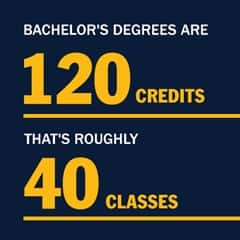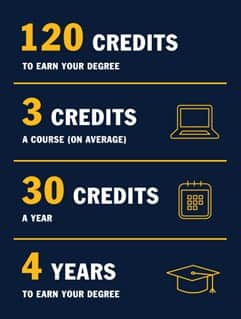How Many Years is a Bachelor’s Degree?

Understanding the numbers
When reviewing job growth and salary information, it’s important to remember that actual numbers can vary due to many different factors—like years of experience in the role, industry of employment, geographic location, worker skill and economic conditions. Cited projections are based on Bureau of Labor Statistics data, not on SNHU graduate outcomes, and do not guarantee actual salary or job growth.
Many college graduates spend four years earning the 120 credits needed for a bachelor’s degree. But that’s only one path to a degree. An online bachelor’s degree program can help you fit your learning into a busy schedule while working toward the key credential.
Your personal preferences, the time and resources you can put toward your coursework and especially any credits you’ve already earned are all factors that will impact how quickly you can reach your educational goals.
But First: What is a Bachelor’s Degree?
If you're looking to further your educational and career opportunities, you may want to consider a bachelor's degree. A bachelor's degree is an undergraduate degree designed to provide you with skills and knowledge related to your chosen area of study, along with broad foundational knowledge gained through general education courses.
 "Students choose a major, or an area to study, and this will define what major courses are required," said Alyssa Claerhout, an academic advisor at Southern New Hampshire University (SNHU). Drawing on her experience in social research and UX research and design in higher education, Claerhout developed a systemic approach to best support her students in understanding the impact of their educational choices.
"Students choose a major, or an area to study, and this will define what major courses are required," said Alyssa Claerhout, an academic advisor at Southern New Hampshire University (SNHU). Drawing on her experience in social research and UX research and design in higher education, Claerhout developed a systemic approach to best support her students in understanding the impact of their educational choices.
This is particularly important as earning a bachelor's degree can open many doors for you. For instance, according to a study from Cengage Group, a global education technology company, 62% of employers require a degree for entry-level jobs (Cengage PDF source). And if you'd like to pursue additional education, such as a master's degree, earning a bachelor's degree may be the first step.
So How Long Does It Take The Average Person to Get a Bachelor’s Degree?
Known as a four-year degree, a bachelor's degree sometimes — but not always — takes four years to complete.
"A bachelor's degree is 120 credits long but can take longer if a student switches majors or schools, as different majors (and schools) have different requirements for each," Claerhout said.
Every student is different, so the amount of time you need to earn a bachelor's degree can vary depending on your schedule, major and previously earned credits.
It’s Personal
One thing you may not have realized is just how personal earning a degree is. It’s all about you, your goals and what’s going on in your life. For example, do you have time to commit to being a full-time college student at a traditional campus, or is there a need to schedule education around your life — be it full-time work, raising a family or other responsibilities?
Maybe you haven’t thought school was possible simply because you have so much going on. There are options out there, such as online degree programs, that allow you to move toward your educational goals while balancing everything else. Determining when and how you want to learn may influence your potential timeline.

How Fast Can You Get a Bachelor’s Degree?
While a bachelor’s degree typically takes four years to complete, that time can vary — especially if you’re earning an online bachelor’s degree.
At SNHU, students pursuing their bachelor's degree online typically take one or two courses per term. With six 8-week terms throughout the year, you can complete as many as 12 courses annually.
 An online degree program offers far more flexibility than on-campus degrees, said Stephanie Ratliff, an admission counselor at SNHU for the past decade. Ratliff has worked with many different types of students and understands that flexibility allows you to fit your education around your career, family and other obligations.
An online degree program offers far more flexibility than on-campus degrees, said Stephanie Ratliff, an admission counselor at SNHU for the past decade. Ratliff has worked with many different types of students and understands that flexibility allows you to fit your education around your career, family and other obligations.
While flexibility may be key in allowing you to finish your bachelor's degree faster, keep in mind that coursework can still take up to 15 hours each week. So, it’s important to consider how much time you can put toward your degree when signing up for classes.
“Online courses are flexible because we’re never going to tell them when they have to be on their computer or how many times they need to be logging in,” Ratliff said. “But I usually tell students, start with one class, get your feet wet, gauge the workload and see how things feel.”
Will My Credits Transfer?
Another important consideration is where you are in your academic journey. Are you starting completely new to a degree program, or have you earned course credits along the way? If you’ve completed any prior college coursework, you'll need those transcripts to determine whether your credits will transfer to your new college or degree program, saving you time and money. At SNHU, an admission counselor walks you through this process from start to finish.
If you have prior credits to add to the mix, be sure to check on a potential school’s credit transfer policy. You’ll want to take full advantage of any credits you have available and ensure that the school you choose is transfer-friendly.
"Transferring credits is easy," Claerhout said. "Students can request transcripts from other schools to be sent to SNHU."

She noted that universities will typically have instructions on how to request transcripts to be sent to other schools. At SNHU, you can transfer up to 90 credits toward an undergraduate degree. With a full transfer load, you could complete your degree in as few as five terms or 10 courses.
When she decided to go back to school 20 years after earning an associate degree, Camellia Varnado '20 said she thought she'd have to start all over. But when she found out 60 of her credits would transfer, that was the moment she knew she was committed to going back to school. "That was huge for me to be able to use most of the credits to go into my bachelor's degree," she said.
Could you have up to 75% of your program done by the time you start at SNHU? Here's how you can find out:
- Complete the free 5-minute online application. There’s no obligation after filling it out.
- Get your transcripts requested — for free. Chat with an admission counselor, and we'll request your transcripts on your behalf.
- Receive your free evaluation. Soon after all your transcripts are in, you'll get your official evaluation. It will show you what was transferred in — and what classes you need to complete.
Previous professional experience could also help you move through your degree faster, allowing you to earn college credit for work experience and prior knowledge. Industry-specific credentials, professional certifications and law enforcement training could all help you earn college credit and reduce the number of courses needed to complete your degree.
Are you starting fresh? Here’s what you need to know: To complete a bachelor’s degree, you must earn 120 credits. This translates roughly to about 40 undergraduate courses, including general education components and courses specific to the area of interest within your degree program, along with some elective courses of your choosing.
Put a Plan Together
Whether you have transfer credits in the mix or are just starting, think about the time you have to commit to your education and what you hope to achieve. What’s a realistic timeline for you?

You could feel a bit nervous about expectations and schoolwork, which may be a whole new experience for you. That's where support and assistance from your school come in. Don’t be afraid to ask questions related to your concerns. Admission team members should be able to answer your questions and get you off to a solid start. Be sure to ask about resources and support available as you go through your courses and where to turn when you need help.
If you’re not comfortable with their answers, their particular school may not be the right fit for you.
When it's time to register for courses, you'll want to create a schedule that allows for a reasonable workload and the ability to balance other responsibilities in your life. Once you have completed a term or two, you’ll be able to assess if this schedule is feasible for you and adjust accordingly. Remember, life consistently offers up challenges and changes, and you may need to be flexible in changing up your workload at school from time to time.
"At SNHU, your advisor will complete your course plan (your map of classes to graduation) automatically, but students do always have the power to speak with their advisor about adjusting classes or shifting things around," Claerhout said.
Are Online Degrees Less Expensive?
The cost will also be a significant factor when mapping out your plan, and perhaps it's the primary reason you’ve shied away from returning to school. The cost of a bachelor’s degree can vary significantly. Earning an online bachelor’s degree can often help you save money compared to an on-campus degree because you won't need to consider student housing costs, meal plans and other fees for on-campus services.
But it’s important to remember that even as an online student, you’ll likely have additional costs on top of your tuition. Textbooks, online learning resources, software and specific technology may be needed to help you complete your courses and earn your degree.
If you’re planning on getting started with a bachelor’s degree program, be sure to ask about financial aid and scholarships:
- Students earning undergraduate degrees are eligible for a student loan or the Federal Work-Study program.
- Private loans and scholarships from your university or a third-party organization may also be available.
- You may even qualify for tuition assistance benefits from your current employer, especially if your degree will help you advance in your career.
Speak to a student financial services team member about how you can pay for college, and you may be surprised to learn that college is indeed within your financial reach.
Find Your Program
Getting Ready: Are Bachelor’s Degrees Always 4 Years?
As you think about the time required to earn your bachelor’s degree, remember:
- It’s personal. Consider your goals and responsibilities and what schools offer programs based on your academic interests.
- Starting points vary. Whether you've taken college courses or not, you may be able to reduce your time with existing credits or accepted credentials.
- Plans are flexible. What type of schedule works well for you now may change as you progress through your degree.
 Combine your goals, options and starting point to put together a plan. Understanding these three variables can help you create a plan that takes a potential four-year degree path down to two years or allows you to create a plan over six or more years.
Combine your goals, options and starting point to put together a plan. Understanding these three variables can help you create a plan that takes a potential four-year degree path down to two years or allows you to create a plan over six or more years.
As you define your goals, consider this simple equation: You need 120 credits to earn your degree. If the average course is three credits, then taking 30 credits a year breaks out into a four-year period of time. If you can up the course load to almost 40 credits a year, it breaks down into three years and so on. The more credits each year, the less time it takes to finish your degree — and the opposite as well. Your course load determines the length. With transfer credits, you’ll be able to lessen that time for completion.
Don’t forget to turn to school admission and advising teams for help, and let your family and friends be an important part of your support team so you can keep moving forward and earn your bachelor’s degree.
What Degrees Can You Get Completely Online?
 Now that you know how to tailor your timeline to your life, you might be interested in learning what degrees are available to pursue online. Well, no matter what your career interests are, there’s an online bachelor’s degree that can help you get there.
Now that you know how to tailor your timeline to your life, you might be interested in learning what degrees are available to pursue online. Well, no matter what your career interests are, there’s an online bachelor’s degree that can help you get there.
There are two main types of bachelor's degrees: a Bachelor of Arts and a Bachelor of Science. You may be wondering what the difference is.
An online Bachelor of Arts (BA) degree, often described as a liberal arts degree, is designed to give you general knowledge on a subject and help you develop critical thinking and communication skills.
Online bachelor’s degree options for BA majors include:
- Bachelor of Arts in Communication
- Bachelor of Arts in Creative Writing
- Bachelor of Arts in Graphic Design
- Bachelor of Arts in Human Services
- Bachelor of Arts in Psychology
An online Bachelor of Science (BS) degree is focused on teaching the technical skills you need to succeed in a variety of careers.
Online bachelor’s degree options for BS majors include:
- Bachelor of Science in Accounting
- Bachelor of Science in Business Administration
- Bachelor of Science in Criminal Justice
- Bachelor of Science in Healthcare Administration
- Bachelor of Science in Information Technology
Ready to get a bachelor’s degree that supports your intended career path? The first step is choosing the program that's right for you.
What Bachelor’s Degrees Are in Demand?
![]() Online bachelor’s degrees across many industries are in demand, including business, science, healthcare, technology and many other fields.* In today’s competitive job market, earning an online bachelor’s degree can help you stand out and boost your long-term earning potential.
Online bachelor’s degrees across many industries are in demand, including business, science, healthcare, technology and many other fields.* In today’s competitive job market, earning an online bachelor’s degree can help you stand out and boost your long-term earning potential.
Bachelor’s degrees are the most common type of college degree. According to a 2023 U.S. Census Bureau report, 23% of adults age 25 and older have a bachelor’s degree.
Four-year degrees are also increasingly in demand.* The U.S. Bureau of Labor Statistics (BLS) projects that jobs for bachelor’s degree holders will grow 7.2% by 2033 — faster than jobs for workers without a college degree.*
Bachelor’s degree holders may also earn more than workers without a four-year degree. According to BLS data, bachelor’s degree holders earned 41% more per week in 2023 than workers with an associate degree and 66% more per week than workers with a high school diploma.*
Unemployment rates are also lower for workers with a bachelor's degree, at 2.2% in 2023, according to BLS.* That same year, associate degree holders saw a 2.7% unemployment rate, and workers without a college degree saw 3.3%, BLS reported.*
Earning a bachelor’s degree can also help you prepare for a master’s degree program, certificate program or professional credential, which can help you advance your career even further.
How to Choose an Online Bachelor’s Degree
 Whether you have a specific major in mind or want to complete an undergraduate degree you previously started, it's important to research all your degree options before applying, said Amanda Wright, an admission team lead at SNHU.
Whether you have a specific major in mind or want to complete an undergraduate degree you previously started, it's important to research all your degree options before applying, said Amanda Wright, an admission team lead at SNHU.
You can start by thinking about the type of work you enjoy doing and the work environment you’d like to be in on a daily basis.
It's also important to determine if your chosen career path requires any specific educational credentials or licensure to work in the field and make sure your chosen online bachelor’s degree meets these requirements, Wright said.
If you're wondering what jobs you can get with a bachelor's degree, some may require a specific educational background. For example, licensing organizations may require a degree from an accredited program. Other job listings may list a preferred major — such as someone with a business degree.
Is an Online Bachelor’s Degree Right for You?
Whether you’re leaving a job to start a new career or advancing in your current role, an online bachelor's degree can help you stand out in a competitive job market.
No matter what career path you hope to follow, earning a bachelor’s degree can give you a leg up when applying for new jobs or seeking a promotion. If you’ve been working in your field without a degree, earning a four-year degree can help you turn your professional experience into a marketable credential, boosting your long-term career and earning potential.
Still wondering if an online bachelor’s degree is right for you? Take some time to consider your goals and how you want your career to grow, said Wright.
“One fear of a lot of students is that they don’t want to start something they’re not 100% sure about,” Wright said. “But focus on why you want to go back to school. Finding that 'why' can help you determine if a bachelor’s degree is the right idea for you.”
A degree can change your life. Find the SNHU bachelor's degree that can best help you meet your goals.
*Cited job growth projections may not reflect local and/or short-term economic or job conditions and do not guarantee actual job growth. Actual salaries and/or earning potential may be the result of a combination of factors including, but not limited to: years of experience, industry of employment, geographic location, and worker skill.
Pamme Boutselis ’15, ’17G is an award-winning writer and content producer, currently serving as a senior director of content and a communication adjunct at Southern New Hampshire University. She loves hearing and sharing stories. As a writer spanning a 25-year career, her work has been featured in print and online via news media, career and education-focused blogs, regional magazines, technology publications and more.
A bachelor’s and master’s in communication — earned as an adult learner — positively impacted her life and career, melding decades in diverse industries with professional and academic knowledge and experience. A serial volunteer, Boutselis has been a TEDx organizer since 2013 and a speaker coach. She’s been fortunate to work with dozens of nonprofits throughout the years. Connect with her on LinkedIn.
Explore more content like this article

How to Get a Scholarship (And Why It Matters If You Do)

What is Tuition Reimbursement? The Often-Overlooked Employee Benefit

Misinformation vs. Disinformation in the Age of AI
About Southern New Hampshire University

SNHU is a nonprofit, accredited university with a mission to make high-quality education more accessible and affordable for everyone.
Founded in 1932, and online since 1995, we’ve helped countless students reach their goals with flexible, career-focused programs. Our 300-acre campus in Manchester, NH is home to over 3,000 students, and we serve over 135,000 students online. Visit our about SNHU page to learn more about our mission, accreditations, leadership team, national recognitions and awards.


